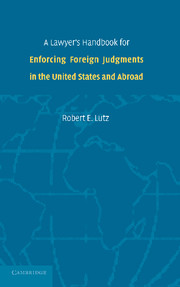Book contents
- Frontmatter
- Contents
- Preface
- Acknowledgments and Dedication
- Introduction
- PART ONE ENFORCING FOREIGN COUNTRY JUDGMENTS IN THE UNITED STATES
- PART TWO ENFORCEMENT OF JUDGMENTS ABROAD
- PART THREE THE FUTURE OF ENFORCING FOREIGN JUDGMENTS
- I Introduction
- II Hague Convention on Exclusive Choice of Court Agreements
- III International Jurisdiction and Judgments Project of the American Law Institute
- IV Revision of the Uniform Foreign-Money Judgment Recognition and Enforcement Act
- V International Trade Flexibility and Enforcing Foreign Judgments
- VI Conclusion
- Bibliography
- Index
III - International Jurisdiction and Judgments Project of the American Law Institute
Published online by Cambridge University Press: 16 November 2009
- Frontmatter
- Contents
- Preface
- Acknowledgments and Dedication
- Introduction
- PART ONE ENFORCING FOREIGN COUNTRY JUDGMENTS IN THE UNITED STATES
- PART TWO ENFORCEMENT OF JUDGMENTS ABROAD
- PART THREE THE FUTURE OF ENFORCING FOREIGN JUDGMENTS
- I Introduction
- II Hague Convention on Exclusive Choice of Court Agreements
- III International Jurisdiction and Judgments Project of the American Law Institute
- IV Revision of the Uniform Foreign-Money Judgment Recognition and Enforcement Act
- V International Trade Flexibility and Enforcing Foreign Judgments
- VI Conclusion
- Bibliography
- Index
Summary
INTRODUCTION
A force more likely to shape the future of the enforcement of foreign judgments in the United States than the Hague Convention on Choice of Court Agreements is the American Law Institute's (ALI) recent drafting of a model federal statute called the International Jurisdiction and Judgments Project. In 1998, “in anticipation of conclusion and ratification of the Hague Convention,” this project commenced to draft implementing federal legislation for executing in the United States the then-proposed Hague Convention of Recognition and Enforcement of Foreign Judgments, which was in negotiation at the time. When both the scope and success of the Convention became doubtful in 2000, the ALI switched focus to drafting federal legislation without relationship to any outside convention. The project that was originally motivated by a need to increase support for the Hague Convention took on the new goal of creating a “federal standard” for the enforcement and recognition of foreign judgments in the United States.
The project incorporates the principle that foreign judgments should not be reviewed on the merits by enforcing courts, and it proposes a framework of recognition designed to simplify and unify the process. The success of the project depended on the ability of the drafters to reach a consensus as to two major issues: reciprocity and public policy as grounds for non-recognition. In 2004, the Council submitted a redlined version recommending changes to be included in the Proposed Final Draft. A version containing those revisions was published April 11, 2005.
- Type
- Chapter
- Information
- Publisher: Cambridge University PressPrint publication year: 2006



